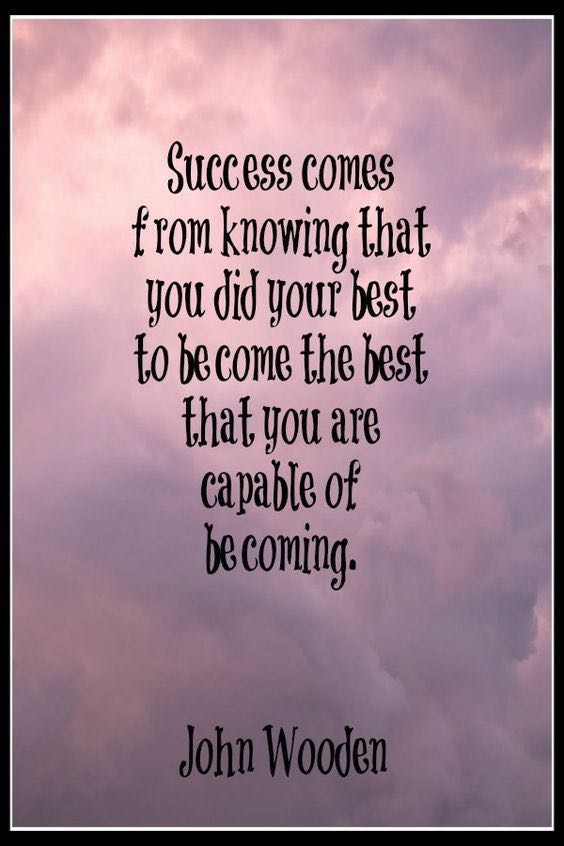
John Wooden is the winningest coach in the history of college basketball. He coached the UCLA men’s basketball team to ten national championships, seven of those in consecutive years. But that’s not what impresses me about coach Wooden. What impressed me was how he defined as something other than winning basketball games.
I understood that ultimately the winning or losing may not be under my control. What was under my control was how I prepared myself and our team. I judged my success, my “winning,” on that. It just made more sense.”
Coach Wooden explains his philosophy in his excellent book Wooden: A Lifetime of Observations and Reflections on and off the Court by writing, “I understood that ultimately the winning or losing may not be under my control. What was under my control was how I prepared myself and our team. I judged my success, my “winning,” on that. It just made more sense.” Notice he did not define success as winning games or national titles. The coach understood that the outcome of games was not entirely up to him. What was fully in his power was how well he coached his players and whether they played up to their potential, so he defined success as getting the most out of his team win or lose. Yet, by focusing on preparing and getting everyone to play at their best, Wooden won most of his games.
For John Wooden, success is becoming the best you can be. Growing as close to your own personal potential as you can is success. Anything less is a wasted opportunity. As Coach Wooden puts it, “Success is giving 100 percent of your effort, body, mind, and soul, to the struggle. That you can attain. That is success.” You cannot control the outcome of an event, but you can control whether you commit to giving 100%. If you give your all and still don’t “win,” you are a success in the eyes of the coach. He makes it clear in his book that when the team lost a big game, Wooden still felt he and his team had succeeded because they had played at their best. The other side had just played better. That did not reflect poorly on the UCLA team, it reflected well on their opponent.
John Wooden makes it clear that his rules apply to life outside of the basketball court. Want to have a satisfying experience? Then take these words to heart: “Success is peace of mind that is the direct result of self-satisfaction in knowing you did your best to become the best that you are capable of becoming.” Notice Wooden defines success as the “peace of mind” you get from becoming the “best that you are capable of becoming.” He does not define success as achieving your goal or winning, just as putting your best effort into the challenge. There is no guarantee that putting forth your best effort will mean that you will “win.” Still, the coach does promise us “self-satisfaction” when we commit fully to become our best, regardless of the outcome.
I was once told a story about the difference between heaven and hell. Imagine that you die and go to the afterlife. Once there, you meet the person you were meant to be if you lived up to your full potential, took chances, and gave 100% of yourself to everything you did. Now, are you in heaven or hell? Depends. If you came close to becoming what you could have become, you would be in heaven. But if you look at the person you were meant to be and see how you fell short, you will be in hell.
For the winningest coach in the history of college basketball, it is not about winning. It’s about the self-satisfaction that comes from knowing you did your best to become what you are capable of becoming. It is a game where you can succeed even if you don’t win. You can also lose even if you do “win,” but know that you did so by not giving your best. In the end, you will be the only person who can ultimately judge your level of success, because you are the only person who will know if you gave it your all.
What does your best self look like? Stop for a minute and picture in your mind what you would look like if you became “the best that you are capable of becoming.” What would you look and dress like? How would you hold yourself? Where would you live? What would you do? With who? Seriously take a moment and get a solid picture of what you would be like at your best. Better yet, grab your journal and write out a description of yourself at your best. List the changes you made. The challenges you faced. The things you learned and how all of it only made you better, whether you “won” or “lost” because you gave your best. Get it all down on paper in front of you. Got it? Now go do it.
I’ll let the coach have the last word;
“Try your hardest in all ways and you are a success. Period. Do less than that and you have failed to one degree or another.”
I highly recommend John Wooden’s book, Wooden: A Lifetime of Observations and Reflections on and off the Court. It is written as a series of brief essays rather than as a long story. Each brief section is a little lesson that lends itself to being read in short bust if you are busy. The wisdom it contains on life, character, excellence, the importance of getting the little things right, and yes, basketball is densely packed and highly quotable. Get your copy here.

